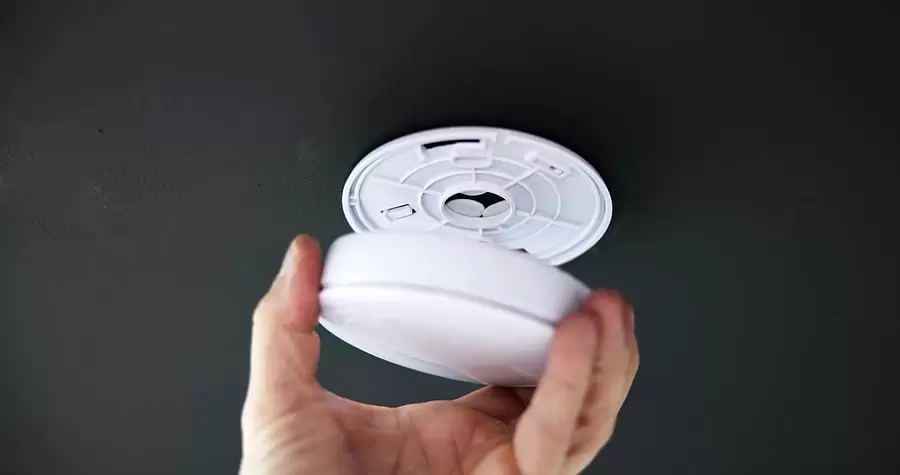Do not Ignore: When Fire Alarm Beeping or Smoke detector Chirping
- Rahul Goel
- /
- April 29, 2024
- /
For your home safety, few simple things are very crucial, such as fire alarms and smoke detectors. These simple devices serve as the first line of defense against the devastating effects of fires, providing early warnings that can mean the difference between life and death. From residential homes to commercial properties, their presence is not just recommended but often legally mandated. In this article, we'll delve into the significance of fire alarms and smoke detectors in properties, exploring their functions, maintenance, and the actions to take when they signal warnings.

About Fire Alarms and Smoke Detectors
Fire alarms and smoke detectors are designed to detect the presence of smoke or fire and emit a loud, distinctive sound to alert occupants of potential danger. While they both serve similar purposes, there are some differences in their functionality:
Smoke Detectors: These devices are primarily designed to detect the presence of smoke, which is often an early indicator of a fire. There are two main types of smoke detectors: ionization and photoelectric. Ionization smoke detectors are more responsive to flaming fires, while photoelectric smoke detectors are better at detecting smoldering fires. Many modern smoke detectors utilize a combination of both technologies for enhanced effectiveness.
Fire Alarms: Fire alarms, also known as smoke alarms or smoke detectors, are part of a property's fire alarm system. They are interconnected devices that are typically hardwired into a building's electrical system and may also have battery backups. When one alarm detects smoke or fire, it triggers all the interconnected alarms in the building to sound simultaneously, providing widespread notification to occupants.
Why Smoke Detector Chirping or Smoke Detector beeping?
Never avoid when Smoke Detector Chirping or Smoke Detector beeping. The most common reason for a smoke detector to chirp is a low battery. When the battery power becomes insufficient, the smoke detector emits a periodic chirp to alert you to replace the battery. Ignoring this chirping can leave your home vulnerable in the event of a fire, as the detector may fail to function when needed most.
What to Do When Your Smoke Detector Chirps:
Replace the Battery: As soon as you hear the chirping, replace the battery with a fresh one. Most smoke detectors operate on standard 9-volt batteries or lithium batteries. Refer to the manufacturer's instructions for the correct type of battery.
Test the Detector: After replacing the battery, test the smoke detector to ensure it's functioning correctly. Most detectors have a test button that, when pressed, triggers a loud alarm sound. If smoke detector beeping means the detector is working correctly.
Clean the Detector: Dust, dirt, and debris can accumulate inside the smoke detector, affecting its performance. Use a soft brush or vacuum cleaner attachment to gently clean the exterior and interior of the detector.
Check for Interference: Smoke detectors can be sensitive to environmental factors such as steam from showers or cooking. Ensure the detector is installed in an appropriate location away from sources of interference.
Understanding Fire Alarm Beeping
In addition to chirping due to low battery, smoke detectors may emit a continuous beeping sound in response to other issues:
Smoke Detection: If the detector senses smoke or fire, it will emit a continuous beeping to alert occupants of the potential danger. Evacuate the premises immediately and call emergency services.
Malfunction: A malfunctioning smoke detector may beep intermittently or continuously. In such cases, follow the manufacturer's instructions for troubleshooting or consider replacing the detector.
Conclusion
Fire alarms and smoke detectors are indispensable components of property safety, providing early warnings that can save lives and minimize property damage in the event of a fire. By understanding their functions, performing regular maintenance, and responding promptly to alarms, property owners can help ensure the safety and well-being of occupants.
The steps involved in smoke detector installation include assessing the property, determining the number of smoke detectors required, choosing the type of smoke detector, installing the smoke detectors, testing the smoke detectors, and providing maintenance and repair services. For complete service related to your residential or commercial needs for smoke detectors or fire alarms contact Baltimore Wiring Solutions today or visit www.baltimorewiring.com
